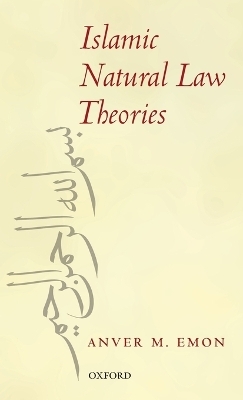
Islamic Natural Law Theories
Seiten
2010
Oxford University Press (Verlag)
978-0-19-957900-6 (ISBN)
Oxford University Press (Verlag)
978-0-19-957900-6 (ISBN)
This book offers the first sustained jurisprudential inquiry into Islamic natural law theory. It introduces readers to the central figures in the Islamic natural law tradition and their canonical works, analyses the historical development of Islamic jurisprudence and explains the major contrasts with Western traditions of natural law.
This book offers the first sustained jurisprudential inquiry into Islamic natural law theory. It introduces readers to competing theories of Islamic natural law theory based on close readings of Islamic legal sources from as early as the 9th and 10th centuries CE. In popular debates about Islamic law, modern Muslims perpetuate an image of Islamic law as legislated by God, to whom the devout are bound to obey. Reason alone cannot obligate obedience; at most it can confirm or corroborate what is established by source texts endowed with divine authority.
This book shows, however, that premodern Sunni Muslim jurists were not so resolute. Instead, they asked whether and how reason alone can be the basis for asserting the good and the bad, thereby justifying obligations and prohibitions under Shari'a. They theorized about the authority of reason amidst competing theologies of God. For premodern Sunni Muslim jurists, nature became the link between the divine will and human reason. Nature is the product of God's purposeful creation for the benefit of humanity. Since nature is created by God and thereby reflects His goodness, nature is fused with both fact and value. Consequently, as a divinely created good, nature can be investigated to reach both empirical and normative conclusions about the good and bad. They disagreed, however, whether nature's goodness is contingent upon a theology of God's justice or God's potentially contingent grace upon humanity, thus contributing to different theories of natural law.
By recasting the Islamic legal tradition in terms of legal philosophy, the book sheds substantial light on an uncharted tradition of natural law theory and offers critical insights into contemporary global debates about Islamic law and reform.
This book offers the first sustained jurisprudential inquiry into Islamic natural law theory. It introduces readers to competing theories of Islamic natural law theory based on close readings of Islamic legal sources from as early as the 9th and 10th centuries CE. In popular debates about Islamic law, modern Muslims perpetuate an image of Islamic law as legislated by God, to whom the devout are bound to obey. Reason alone cannot obligate obedience; at most it can confirm or corroborate what is established by source texts endowed with divine authority.
This book shows, however, that premodern Sunni Muslim jurists were not so resolute. Instead, they asked whether and how reason alone can be the basis for asserting the good and the bad, thereby justifying obligations and prohibitions under Shari'a. They theorized about the authority of reason amidst competing theologies of God. For premodern Sunni Muslim jurists, nature became the link between the divine will and human reason. Nature is the product of God's purposeful creation for the benefit of humanity. Since nature is created by God and thereby reflects His goodness, nature is fused with both fact and value. Consequently, as a divinely created good, nature can be investigated to reach both empirical and normative conclusions about the good and bad. They disagreed, however, whether nature's goodness is contingent upon a theology of God's justice or God's potentially contingent grace upon humanity, thus contributing to different theories of natural law.
By recasting the Islamic legal tradition in terms of legal philosophy, the book sheds substantial light on an uncharted tradition of natural law theory and offers critical insights into contemporary global debates about Islamic law and reform.
Anver M. Emon is an Assistant Professor at the Faculty of Law, University of Toronto, where he specializes in Islamic law and history. Professor Emon's research focus is on premodern and modern Islamic law and legal theory, premodern modes of governance and adjudication, and the role of Shari'a both inside and outside the Muslim world. He is the founding editor of Middle East Law and Governance: An Interdisciplinary Journal, and lectures widely about the intersection between rule of law, governance, and Shari'a.
I. Introduction ; II. Hard Natural Law ; III. The Voluntarist Critique of Hard Natural Law ; IV. Soft Natural Law ; V. Conclusion
| Erscheint lt. Verlag | 8.4.2010 |
|---|---|
| Verlagsort | Oxford |
| Sprache | englisch |
| Maße | 148 x 222 mm |
| Gewicht | 436 g |
| Themenwelt | Geisteswissenschaften ► Philosophie ► Östliche Philosophie |
| Recht / Steuern ► Allgemeines / Lexika | |
| Recht / Steuern ► EU / Internationales Recht | |
| ISBN-10 | 0-19-957900-8 / 0199579008 |
| ISBN-13 | 978-0-19-957900-6 / 9780199579006 |
| Zustand | Neuware |
| Haben Sie eine Frage zum Produkt? |
Mehr entdecken
aus dem Bereich
aus dem Bereich


